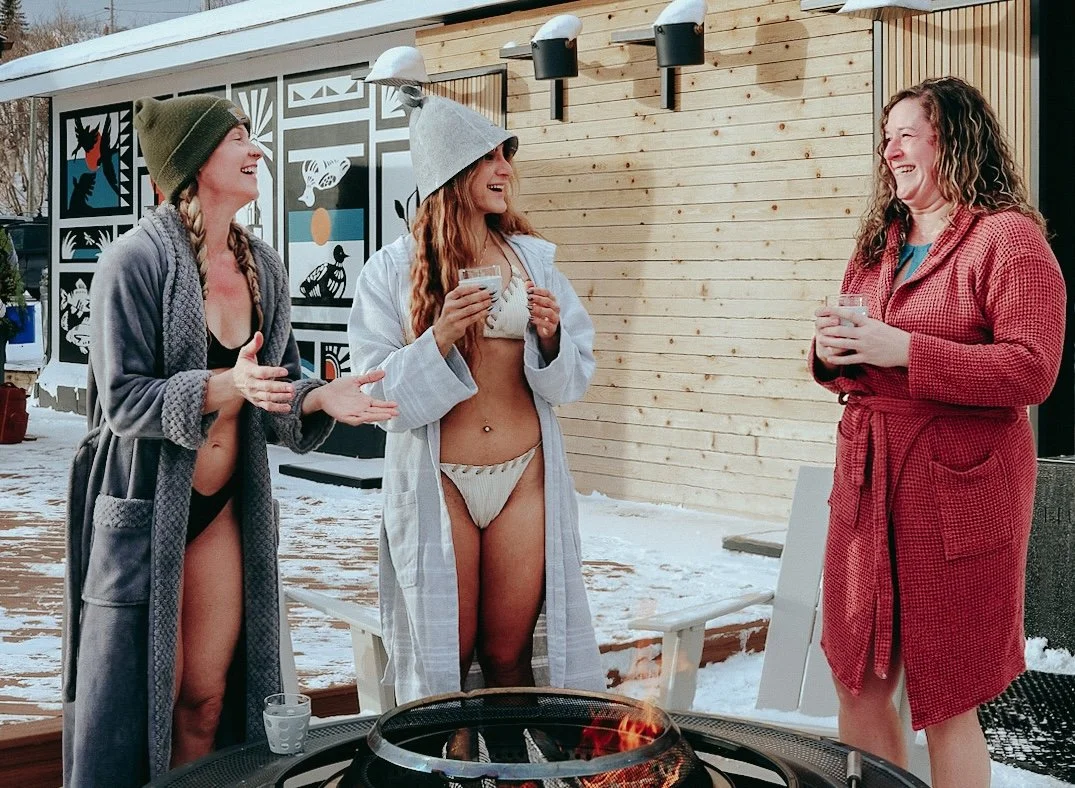Hydration & Heat: Don’t Sweat Dehydration
Your sauna session isn’t just a sweat; it’s a powerful reset. But without proper hydration, that glow can turn into a pounding headache. We’re all about feeling epic post-sauna, not dragging home drained.
Let’s break down the science—so you leave hydrated, happy, and high-five-ready.
What Happens When You Sweat (a Lot)
Sweating is more than just water loss. It's how your body regulates heat, detoxifies, and cools down. In a typical 20–30 minute sauna session, you can lose between 0.3 to 0.5 kg of water (roughly 0.7–1.1 lbs), depending on sauna type, temperature, and your body’s physiology (MDPI).
But it’s not just water. You’re also shedding sodium, potassium, magnesium, and chloride—key players in muscle function, energy, and nerve signaling. This is why sauna-induced dehydration can leave you not only thirsty but foggy, crampy, and headachy.
But Sweating Is Good for You, Too
Sweating isn’t just your body “losing” fluid — it’s an active health benefit of the sauna ritual.
Temperature regulation: Sweating is your body’s natural air conditioning system, helping you stay safe and comfortable in the heat.
Circulation boost: The process increases blood flow, delivering more oxygen and nutrients to your skin and muscles.
Skin health: Sweat helps open pores and clear out impurities, giving skin a post-sauna glow.
Stress release: Many people find the act of sweating deeply cathartic — a literal letting go of the day.
The key is balance. Sweat is how your body heals and resets; hydration is how you keep that process safe and sustainable.
Heat Regulation 101: Why Your Body Needs Water to Sweat
Your core temperature is monitored and regulated by your hypothalamus—a control center in your brain. As internal heat rises in the sauna, blood vessels dilate (vasodilation), your heart rate increases, and sweat glands are activated to cool you down.
But here’s the deal: sweating only works when you have enough fluid to sweat with. Without pre-loading and replenishing fluids, your body struggles to maintain temperature, and the benefits of your sauna session are reduced.
Should You Drink Water in the Sauna?
Yes—but sip smart. If you’re doing a short session (under 20 minutes), hydrating beforehand may be enough. But if you’re in for longer sessions or multi-round cycles, take small sips of room temperature water or a light electrolyte drink between rounds.
Avoid chugging or using icy water—it can shock your system mid-session.
Pro tip: Every sauna session includes our LMNT electrolyte drinks that are formulated for exactly this—gentle, replenishing, and delicious.
Do You Sweat More When Hydrated?
You do. And that’s a good thing.
Research shows that hydrated bodies thermoregulate more efficiently, producing sweat faster and in a more controlled way (Physiological Reviews). You don’t just sweat more—you sweat better, meaning more effective detox and temperature control.
It’s a biological win-win.
When you’re well-hydrated before stepping into the heat, your body doesn’t have to work as hard to cool down. You begin sweating earlier in your session, which prevents overheating and helps you stay in the sauna longer and more comfortably. It also makes each drop of sweat more efficient—carrying away heat and impurities without tipping you into exhaustion.
Hydrated sweat = smarter sweat. And smarter sweat means a safer, more effective, and more rejuvenating sauna experience.
Electrolytes 101: The Unsung Heroes of Sauna Recovery
Electrolytes are electrically charged minerals—like sodium, potassium, calcium, and magnesium—that help your body function at a cellular level. When dissolved in fluid, they conduct electricity, enabling essential processes like nerve signaling, muscle contractions, and fluid balance.
Electrolytes support:
Nerve function – allowing your brain and body to communicate quickly and efficiently
Muscle contraction – including the heartbeat and all voluntary movements
pH balance – keeping acidity levels in your body stable
Fluid retention and balance – helping water stay where it’s needed inside your cells
How does your body process them?
Electrolytes are absorbed through the small intestine after you eat or drink them. From there, they travel in your bloodstream to tissues and organs, where they help regulate everything from hydration to heat response. Your kidneys also play a key role—retaining or excreting electrolytes as needed.
Where do we get electrolytes?
You can get them from a balanced diet—especially from fruits like bananas and oranges, leafy greens, dairy, seeds, nuts, and naturally mineral-rich water. Drinks like coconut water or specially formulated electrolyte beverages are particularly helpful after heavy sweating.
Are they in plain water?
Not usually. Most tap and filtered water contains only trace electrolytes, and distilled or purified water has almost none. That’s why drinking water alone after a sauna may leave you still feeling depleted.
Key electrolytes lost during sauna:
When you’re in the sauna, your sweat glands release fluid that contains not just water, but dissolved electrolytes. Especially:
Sodium – muscle control & blood pressure regulation
Potassium – heartbeat rhythm & hydration
Magnesium – nerve conduction & mood support
Chloride – fluid movement between cells
Without proper replacement, even drinking water can dilute the remaining electrolytes in your body—worsening symptoms like fatigue, dizziness, or cramping (a condition known as hyponatremia).
That’s why at Takka, we include LMNT electrolyte beverages with every sauna booking. They taste amazing, and they help your body recover smarter—not just faster.
Rehydration After Sweating: Science-Backed Recovery
Rehydration helps restore balance so your body can function normally again. The amount of sweat—and electrolytes—you lose in the sauna varies based on things like sauna temperature, session length, fitness level, and body composition.
According to a 2015 study on hydration strategies published in the International Journal of Sport Nutrition and Exercise Metabolism, individuals with a higher BMI tend to experience greater total body fluid losses during exercise and heat exposure. That’s because they often have a higher absolute sweat rate—even if their relative fitness is the same.
How much should you drink?
You should aim to drink about 1.5 times the amount of fluid lost. If you lose ~0.5 kg (about 1.1 lbs) during a sauna session, drink roughly 0.75 liters of fluid within 30–60 minutes post-session. (PMC)
Why electrolytes matter:
Without electrolytes—especially sodium—your body can’t hold onto the water you drink. Plain water alone can actually dilute your remaining minerals, making things worse (a condition called hyponatremia).
Best strategy?
Rehydrate with an electrolyte drink (like the ones we serve at Takka), mineral water, or coconut water. Start within 30 minutes and aim to fully rehydrate within 2 hours.
Bottom line:
Smart rehydration = water + electrolytes + timing. That’s how you avoid the post-sauna crash and leave feeling your best.
Pairing hydration with light nutrition helps your body rebalance fluid and mineral levels, speeding up recovery.
Best drinks after sauna:
Our electrolyte drinks - yes, we're biased—and for good reason. You can even purchase some packets or canned sparkling LMNTs to-go!
Coconut water – natural potassium powerhouse
Mineral water – sodium and trace minerals, especially with a pinch of sea salt
Homemade electrolyte drinks – lemon, sea salt, honey, water
Herbal teas - caffeine-free, hydrating, comforting, and gentle on the stomach
Avoid:
Alcohol (a diuretic)
Sugary sodas
High-caffeine energy drinks or coffee - Caffeine can also act as a diuretic and further dehydrate you if consumed in large quantities post-sauna.
Snacks that help:
Watermelon - Over 90% water, so it helps replace fluids quickly. It’s also rich in potassium and antioxidants like lycopene, which support recovery and reduce inflammation.
Bananas - Famous for their potassium content, which helps restore electrolyte balance, regulate heartbeat, and prevent muscle cramps. Their natural carbs also provide a gentle energy boost after sweating.
Pumpkin seeds - Packed with magnesium, essential for nerve function and muscle relaxation. They also contain zinc and healthy fats, which help support cellular recovery and overall balance after heat stress.
Lightly salted popcorn – If you’re craving something crunchy, this can provide a balance of sodium + carbs without being as dehydrating as chips.
Snacks to Avoid After the Sauna
Salty processed snacks (like chips or pretzels): While you do need sodium, ultra-processed salty snacks are dehydrating, not rehydrating. They often contain excess sodium without potassium or magnesium, throwing off your electrolyte balance.
Sugary treats (candy, pastries): Sugar can impair rehydration by increasing urine output and may cause a quick energy spike followed by a crash—not ideal post-sweat when your body is already depleted.
Fried or greasy foods: High-fat foods slow digestion and can feel heavy or nauseating after heat exposure. They also don’t offer any real hydration or electrolyte support.
How to Know You’re Hydrated Enough
Signs of Good Hydration:
Clear/light yellow urine
Normal energy and focus
No lingering headache post-sauna
Signs of Dehydration
You don’t need a medical chart to know if you’re running low on fluids. Most sauna users will notice:
Feeling more tired than usual
A mild headache
Urine that’s darker yellow than lemonade
The fix? Sip fluids and include electrolytes. If you catch it early, your body usually bounces back within an hour or two.
Myth-Busting: Let’s Get Real
Myth: “You only need to hydrate after.”
Fact: Pre-hydration prevents crashes before they start.
Myth: “Just water is enough.”
Fact: Water without minerals can dilute what you’ve got left. Electrolytes matter.
Myth: “If I’m not thirsty, I’m good.”
Fact: Thirst lags behind dehydration—don’t wait.
Your Hydration Plan at Takka
Pre-Sauna: Drink 16–20 oz water or lemon water 1–2 hrs before
During Session: Sip lightly if needed—especially during multi-rounds
Post-Sauna: Replenish with electrolyte drink (we’ve got the best one)
Aftercare: Eat water-rich foods, keep sipping throughout the day
At Takka, we include our signature electrolyte drinks with every sauna booking because we know how essential smart hydration is. These drinks taste great, are naturally sweetened, and deliver what your body actually needs—not just sugar or hype.
The Skin Connection: Hydration & Your Glow
Proper hydration isn’t just about how you feel—it shows on your face. Water and electrolytes support skin elasticity, clarity, and tone, especially post-sweat.
Want to go deeper? Check out Are Saunas Good for the Skin? for the full glow-up.
Hydrate. Glow. Repeat.
Your sauna ritual is a full-body investment—and hydration is the thread that holds it all together. When you hydrate with intention, you sweat smarter, recover faster, and feel better long after the last drop of heat.
So grab your bottle, sip something real, and let the warmth work with you.
🔥 Book your next session at Takka, and stay for the hydration. Your body (and brain) will thank you.
Explore more:






